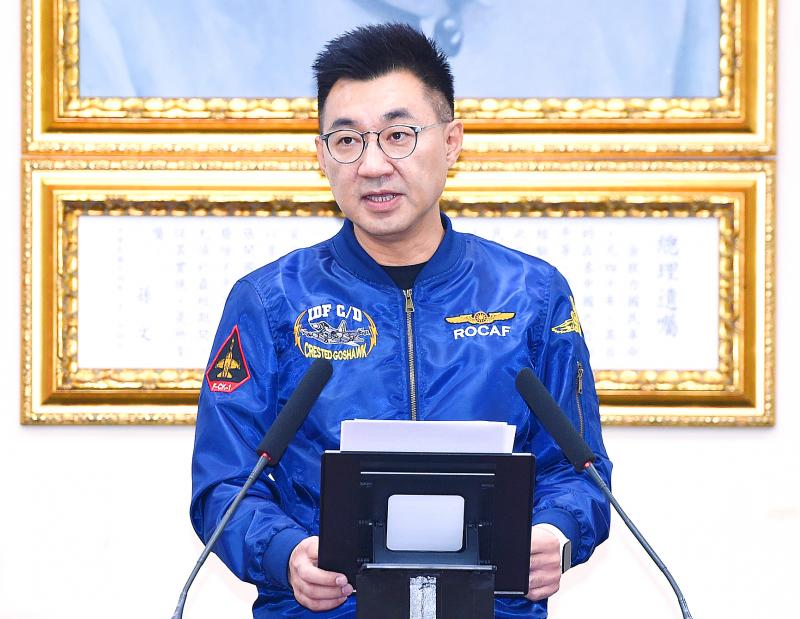The two sides of the Taiwan Strait share the same roots in Chinese culture and have no reason for confrontation, Chinese Nationalist Party (KMT) Chairman Johnny Chiang (江啟臣) said yesterday, but added that they would be driven further apart if one side continued to play the aggressor.
Chiang made the remarks at a meeting with Taiwanese expats in Taipei, part of the party’s series of activities marking the 75th anniversary of Taiwan’s Retrocession Day tomorrow.
Yesterday’s commemoration was attended by KMT members, as well as nearly 80 Taiwanese expats returning from the US and Southeast Asian countries.

Photo: Liao Chen-huei, Taipei Times
In his speech, Chiang said that Oct. 25 was a critical turning point for all Chinese, who in 1945 finally overcame the national disgrace that started with the Opium War in the 1840s, and witnessed the nation’s regeneration.
Taiwanese expats have been the strongest support for the Republic of China (ROC) throughout the years, and have personally taken part in the national revival, he said.
He thanked them for lending their robust support to the ROC during the war with Japan from 1937 to 1945, which mainly took place on the Chinese mainland.
They also played an important role in assisting with the nation’s economic development after the ROC government relocated to Taiwan in 1949, while their investments proved instrumental in fostering the nation’s economic growth, he said.
Taiwan’s liberation from Japanese colonization and return to the ROC’s embrace was the hope of most Taiwanese, a history that embodies the inseparable cord connecting the two sides of the Taiwan Strait, Chiang said.
Despite having different political systems, the two sides are nourished by the same Chinese culture and share the same language, Mandarin, he said.
There is no reason for the two sides of the Strait to confront or hate each other, as their fates are interconnected, he added.
Having gone through stratocracy, two world wars, and countless global political and economic storms, the nation continues to stand firm in its 109th year, he said.
Any verbal aggression or military threat by one side would not heal the wound among Chinese who are split apart, but would instead widen the gap, he said, without naming the perpetrator.
“The ROC’s continuous existence is the sole way to eliminate the pro-Taiwan independence movement,” he said.

Rain is to increase from Wednesday morning as Severe Tropical Storm Kong-Rey approaches, with sea warnings to be issued as early as tomorrow afternoon, the Central Weather Administration (CWA) said today. As of 8am, Kong-Rey was 1,050km east-southeast of the Hengchun Peninsula (恆春) heading in a northwesterly direction toward Taiwan, CWA Forecast Center Director Lin Po-tung (林伯東) said. Rainfall is to increase from Wednesday morning, especially in northern Taiwan and Yilan County, he said. A sea warning is possible from tomorrow afternoon, while a land warning may be issued on Wednesday morning, he added. Kong-Rey may intensify into a moderate typhoon as it passes

Taiwan yesterday issued warnings to four Chinese coast guard vessels that intruded into restricted waters around the Taiwan-controlled Kinmen Islands, according to the Coast Guard Administration (CGA). The four China Coast Guard ships were detected approaching restricted waters south of Kinmen at around 2 pm yesterday, the CGA’s Kinmen-Matsu Branch said in a statement. The CGA said it immediately deployed four patrol boats to closely monitor the situation. When the Chinese ships with the hull numbers "14512," "14609," "14603" and "14602" separately entered the restricted waters off Fuhsing islet (復興嶼), Zhaishan (翟山), Sinhu (新湖) and Liaoluo (料羅) at 3 pm, the Taiwanese patrol

A former member of the US Naval Special Warfare Development Group (DEVGRU), formerly known as SEAL Team 6, said in an interview with Business Insider that the elite unit’s role in a Taiwan Strait conflict would be more limited than some might expect. The report follows an earlier one in September by the Financial Times, which said the “clandestine US Navy commando unit” has been training for missions to help Taiwan if it is invaded by China. “You don’t use a scalpel for a job a hammer can do,” the former Navy Seal said to Business Insider on condition of anonymity.

MUCH-NEEDED: After China demonstrated its capabilities to deploy vertical launching systems, Taiwan needs air defense systems such as NASAMS, a defense expert said The US’ approval of exports of three advanced air defense missile systems to Taiwan signified NATO’s goodwill toward the nation, a Taiwanese defense expert said. The US Defense Security Cooperation Agency on Friday announced the US$1.16 billion sale of the National Advanced Surface-to-Air Missile System (NASAMS) and the US$828 million sale of AN/TPS-77 and AN/TPS-78 radar turnkey systems. The NASAMS is a network that uses ground-launched Air Intercept Missile (AIM)-120 Advanced Medium-Range Air-to-Air Missiles (AMRAAM) to intercept hostile aircraft, drones and cruise missiles. Su Tzu-yun (蘇紫雲), director of defense strategy and resources at the state-funded Institute for National Defense and Security Research, said